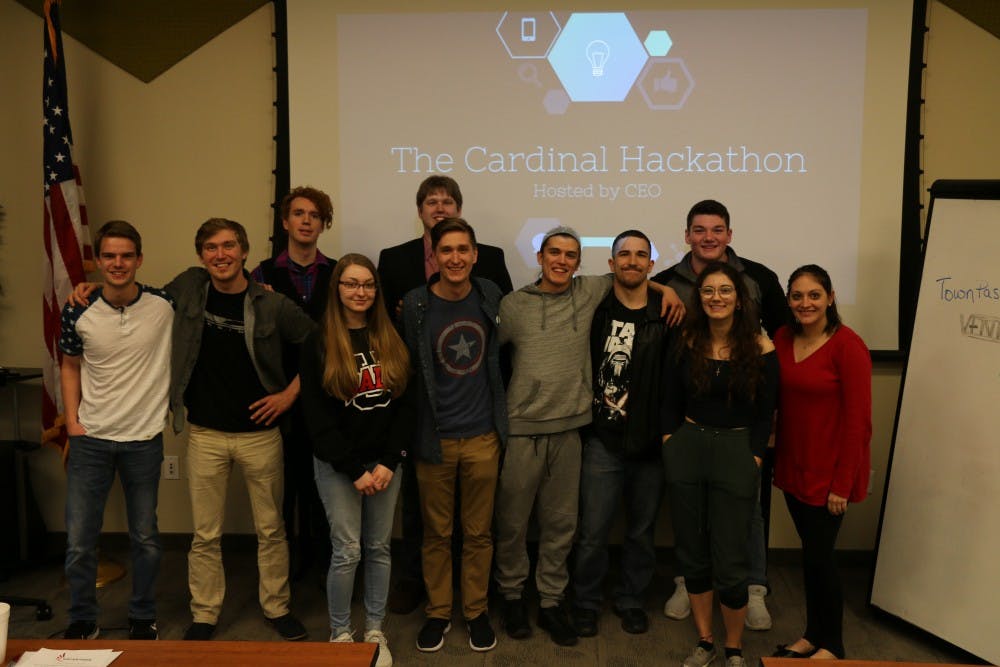This weekend, instead of hacking into the mainframe, members of the Muncie community will hack into problems to find solutions.
The second annual Cardinal Hackathon, according to the event post, is a 24-hour event where “teams of people use their collegiate skills alongside technology to solve a problem or set of problems” within the community. It begins 6 p.m. Friday and ends 6 p.m. Saturday.
The event is hosted by Ball State’s Collegiate Entrepreneurs’ Organization (CEO). Brandi Lambertson, co-president of CEO and 21st Century Scholar support specialist, said she encourages everyone from any educational background to take part in the event.
“Ideas don't just come from, I would say, business students. They come from everywhere,” Lambertson said.
The event is being held at the Innovation Connector since there are no locations on campus open for 24 hours straight. It’s open to the community for anyone ages 18 or older. No previous experience is needed, and food and caffeine is provided.
Participants come, pitch their ideas, decide which are best, split into groups and then work to flesh out the idea.
Krystal Geyer, assistant director of the Entrepreneurship Center and faculty advisor for CEO, said the event came about as a way to bridge the gap between the community and the student body.
She said the campus environment can sometimes create a “microcosm” separate from the community. The Hackathon allows students to talk to community members, and identify and solve real-world problems.
“Take yourself out of your comfort zone for a hot second and see what happens,” Geyer said.
She said hackathons are typically more computer science and engineering focused. However, since Ball State doesn’t have an engineering program of its own, the focus is now on computer science and business, to show that not all solutions have to be high tech.
“You don't have to have business or technology experience by any stretch of the imagination,” Geyer said. “We want to show that everyone has something to contribute.”
Lambertson compared the Hackathon with her experience in Startup Weekend, a 54-hour event where participants form a working prototype and feasible business model. She said events like this show the capacity of what it takes to create a great idea including the research, design, teamwork, dedication, presentation and marketing.
“It’s just a great learning experience all around,” Lambertson said.
Geyer and Lambertson said technology and business can find solutions to problems in many ways including creating apps, programs, products, services and algorithms.
“Everybody spends so much time complaining. We would like to bring people together to talk about how do we solve some of the biggest complaints,” Geyer said.
Geyer also said the Hackathon is long enough to get something done but short enough that it’s not a full commitment.
“I think a lot of times people walk away from an event like this really surprised that they got things done it was pretty simple when you stopped and really focused on it, she said.
Once it ends, all groups must face a panel of four judges, which includes members of the Muncie community and Ball State professors, and pitch the idea they’ve crafted. Their ideas are then judged on “idea, feasibility, community benefit and presentation,” and are awarded more than $150 in prizes, although no specifics in terms of prizes has been announced.
Geyer said that no equity will be taken from the teams, meaning the ideas are solely owned by the people that worked on it. She said she hopes to see plenty of collaboration this year and possibly see a group continue to work on their idea once the Hackathon is over.
“The worst possible thing that could happen is you meet new friends and maybe start a company,” Geyer said.
Contact Andrew Harp with comments at adharp@bsu.edu or on Twitter @adharp24.





